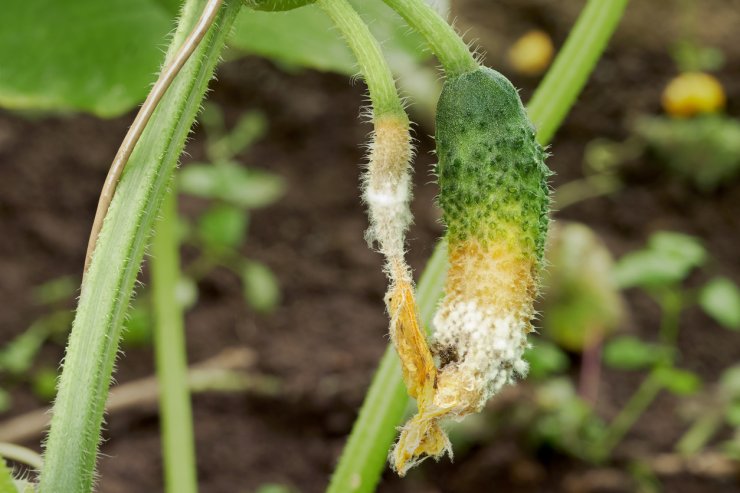
Cucumber with advanced BER.
Blossom-end rot (BER) is a nutrient deficiency that can affect many garden plants, including cucumber fruit. Stems and leaves will show no symptoms.
What does blossom-end rot (BER) look like?
Cucumbers with BER develop a dark, almost black spot on the end of the cucumber where the flower used to be. The spot may look cracked or sunken, and may show fungal growth. The rest of the fruit may appear healthy, and BER may affect only a few of the fruits from the same plant, or all of them.
What causes BER?
A lack of calcium in the cucumber causes BER. Cucumber cells need calcium to grow, and calcium binds the cucumber cells together. Too little calcium in the soil can be the culprit, or too much nitrogen or potassium can prevent the cucumber plants from absorbing calcium from the soil. Insufficient watering can also prevent cucumber plants from absorbing calcium.
Other conditions can hasten the development of BER, such as:
- root damage
- cold temperatures/cold soil
- excessive heat
- large amount of salts in the soil (lowers the availability of calcium)
- markedly acidic or alkaline soil (pH imbalance prevents calcium absorption)
How can you control and treat BER?
Blossom-end rot cannot be reversed on a cucumber once it’s set in, but you can take these steps to slow BER or stop it:
- Preserve affected plants by applying calcium immediately. You can use products specifically developed to treat, prevent, and slow blossom-end rot in cucumbers. Or you can mix 1 tablespoon calcium chloride (sold commercially for other uses as de-icing salt) in 1 gallon of water. Spray two to three times a week until blossom end rot is under control. Apply early in the morning when temperatures are cooler.
- Pick affected fruit to reduce stress on the plant and allow it to direct its energy to other, healthier cucumber fruit.
- Cut out spots on harvested fruit and eat the remaining good part. Blossom-end rot does not make the rest of the cucumber inedible. However, if cucumbers have been infected by fungi or mold, discard them immediately.
How can you prevent blossom-end rot?
There are lots of ways you can take measures to prevent BER in the first place:
- Plant in an area with good drainage.
- Avoid planting too early in the season, which can expose plants to cooler temperatures and cold soil. Allow soil outside to warm up before planting. (Cucumbers like soil at least 70 degrees F.)
- Work plenty of compost and organic matter into your soil before planting so that the plant’s root system has a better chance to grow strong and deep.
- Add quick-release lime when planting cucumbers, so that there’s plenty of calcium in the soil and it gets quickly absorbed. Cucumbers grow best when the soil pH is about 7.
- Keep the water supply for your cucumber plants even throughout the season so that calcium uptake is regular. Cucumbers need about 1 to 2 inches of water a week. The plants perform best when watered deeply a couple of times a week, rather than every day watering as a matter of habit.
- Mulch plants once planted and started growing to maintain moisture levels.
- Cultivate carefully around cucumber plants to avoid damaging root systems. Don’t dig more than an inch or two deep around plants.
Do your cucumber plants suffer rot? Do you have any great tips about how to avoid cucumber rot? Please tell us how you deal with cucumber rot in your garden.


 Previous
Previous


my cucumber is getting abortion please help me out
adamugambo50@gmail.com The cause of blossom end rot is lack of calcium in the fruit as explained. May I dilute very pure Gypsum say, 1 table spoonfull per litre of water and apply generously on Cucumber leaves?
Gypsum contains calcium and sulfur and is a common ingredient in many fertilizers. This is a great option to help with calcium uptake.